WMG News
Used electric vehicle batteries could be used for rickshaws in Bangladesh
Used EV batteries could be used to power rickshaws in Bangladesh, as researchers from WMG, University of Warwick, seek to find out how they can be repurposed for the rickshaws and lower peoples’ carbon footprint.
Motorised rickshaws, also known as easy-bikes, have gained popularity in Bangladesh due to their cost-effectiveness with one million of them all over the country.
However, the easy-bike currently uses a lead-acid battery for power, which has a lifetime of 6-12 months and therefore increases the operating cost as well as the carbon footprint.
In order to reduce the carbon footprint, researchers at WMG are exploring the possibility of repurposing used EV Li-ion batteries thanks to a £25,000 grant from Global Challenges Research Fund (GCRF), an award from the UKRI aimed to deliver scalable solutions to issues faced by low and middle-income countries.
Currently, Li-ion batteries retire from EVs after reaching 70-80% of their state of health (SoH). At 70% SoH, the lithium-ion battery still have 3 times higher energy density than a new lead-acid battery, and potentially can have a lifetime of 3-5 years in easy-bike application.
The researchers hope to repurpose the batteries to improve the energy storage life from 6-12 months to 3-5 years, which in turn will reduce the number of batteries being recycled and improve the ecosystem.
The new application of Li-ion batteries will be better environmentally without an additional cost in transport. As easy-bike replaces manual driving, the quality of life will improve significantly and bring a socio-economic change to a large community in Bangladesh. Furthermore, this development could reduce the consumption of grid-connected electricity which could be used to develop industries and infrastructure.
In fact, there are currently one million rickshaw pullers in Bangladesh who earn $4.8 billion every year. The new development in easy-bikes will directly improve their economic status. A few million people involved in vehicle support such as mechanics and manufacturing industries will also be benefited.
This project eventually could lead to mass production of second-life Li-ion batteries in Bangladesh, in conjunction with UK automobile industries, which will create job opportunities for thousands of people.
 Dr Mohammad Al-Amin from WMG, University of Warwick comments:
Dr Mohammad Al-Amin from WMG, University of Warwick comments:
“To prevent climate change, all cars in the future will need to be electric. However, the batteries in EVs once they have reached their end of life, for car purposes, is something that can be explored more, as there is still energy left in them to be used.”
“If we can re-purpose them to be used for easy-bikes in Bangladesh it will help lower their carbon footprint and provide the country with a new economy. Thousands of jobs opportunities could be created both in Bangladesh and the UK.”
ENDS
13 NOVEMBER 2019
NOTES TO EDITORS
High-res images available at: https://warwick.ac.uk/services/communications/medialibrary/images/october2019/mohammad_photograph.jpg
About GCRF - https://www.ukri.org/research/global-challenges-research-fund/
UK Research and Innovation works in partnership with universities, research organisations, businesses, charities, and government to create the best possible environment for research and innovation to flourish. We aim to maximise the contribution of each of our component parts, working individually and collectively. We work with our many partners to benefit everyone through knowledge, talent and ideas.
Operating across the whole of the UK with a combined budget of more than £7 billion, UK Research and Innovation brings together the seven research councils, Innovate UK and Research England.
FOR FURTHER INFORMATION PLEASE CONTACT:
Alice Scott
Media Relations Manager – Science
University of Warwick
Tel: +44 (0) 2476 574 255 or +44 (0) 7920 531 221
E-mail: alice.j.scott@warwick.ac.uk
The future of mobility: Times are changing
Times are changing
If we are to seize electrification and autonomy opportunities, it’s essential that the UK develops an environment suitable for breakthrough technologies. From domestic charging solutions to developing repeatable testing environments, the UK faces big challenges and we are addressing these through our lead centre for Vehicle Electrification and Connected and Autonomous Vehicles at WMG, University of Warwick.
Electrification shaping a low carbon future
David Greenwood – Professor, Advanced Propulsion Systems at WMG, University of Warwick
Demand for electric vehicles (EVs) is surging in the UK and registrations of plug-in cars increased by more than 160,000 between 2013 and 2018. With the electrification industry estimated to be worth over £6billion by 2025, the next decade presents a massive opportunity.
As our society continues to grow, transformation in energy and mobility is required to create sustainable environments. The electrification of transport is shaping that low carbon future. Our vision at WMG is to enable the development of cleaner, safer and smarter vehicles and help drive sustainable mobility across the UK, which aligns with the Government’s ‘Road to Zero’ strategy, aiming to make road transport emission-free by 2050. Our research focuses on establishing advanced hybrid and electrical vehicles, including commercial, rail and marine, battery technology, supply chain, manufacturing and automation.
At WMG, we’re working with the UK Battery Industrialisation Centre to deliver on the UK’s Industrial Strategy ‘Future of Mobility’ Grand Challenge to transform the UK into a world leading battery manufacturer for vehicle electrification.
Connected and Autonomous Vehicles
Siddartha Khastgir – Head of Verification and Validation, Intelligent Vehicles at WMG, University of Warwick
The global Connected and Autonomous Vehicles (CAV) industry is estimated to be worth over £50billion by 2035, with the UK CAV industry comprising over £3billion of this. The UK Government's Industrial Strategy aims to bring fully autonomous cars without a human operator on UK roads by 2021, which will make us one of the first countries to achieve this.
The CAV vision is motivated by the potential societal benefits the technology offers – increasing safety, decreasing traffic congestion and driving lower emissions. At WMG, we’re striving to deliver these through Intelligent Vehicles research exploring Verification and Validation, Communications (i.e. 5G), Experiential Engineering, Supply Chains, Cyber Security and Cooperative Autonomy.
Our involvement in research programmes like the £35m Midlands Future Mobility focuses on “smart miles”, proving concepts and getting products to market. Led by WMG, Midlands Future Mobility is an “on-road ecosystem” comprising nine partners with a shared objective – To launch the first service offering of public road testing by mid-2020.
Times are changing.
£22m battery and thermal energy facilities launch at the University of Warwick, for a cleaner greener future
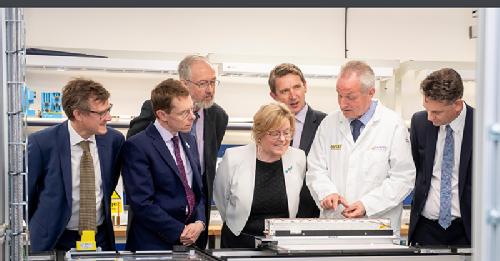 Two research centres for sustainable electrical and thermal energy technologies totalling £22m are launching at WMG, University of Warwick on the 10th June 2019. The funding from government via the Energy Research Accelerator (ERA) sees UK Government, industry and higher education work together to shape the future of the UK’s energy landscape.
Two research centres for sustainable electrical and thermal energy technologies totalling £22m are launching at WMG, University of Warwick on the 10th June 2019. The funding from government via the Energy Research Accelerator (ERA) sees UK Government, industry and higher education work together to shape the future of the UK’s energy landscape.
The Energy Research Accelerator (ERA) is a £60m project funded by Innovate UK. ERA is working with UK government, industry and the higher education sector to undertake innovative research, develop the next generation of energy leaders, and demonstrate low carbon technologies that help shape the future of the UK’s energy landscape.
ERA consists of eight internationally renowned Midlands universities – which includes the University of Warwick, who are part of the Midlands Innovation partnership, together with the British Geological Survey.
Together they will explore the challenges of energy and electrification, with some of the thought leaders and innovators who are making changes in these areas. There will also be an opportunity to tour the new research facilities.
WMG’s Energy Innovation Centre is a world-class facility for battery research from materials and electrochemistry to application integration and recycling/reuse. The £20m ERA investment has enabled new equipment and facilities, which include laboratories, a dry room for cell assembly, characterisation at cell, module and pack levels, innovative charging infrastructure and second-life evaluation facilities. It will drive the development, and scale-up of new battery chemistries from concept through to proven traction batteries.
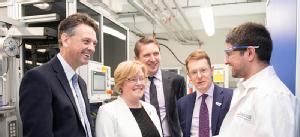 The School of Engineering’s Sustainable Thermal Energy Technologies group develops low carbon heating and cooling technologies. The £2m ERA funding has enabled the extension of the Thermal Properties Lab into five newly-refurbished test cells to accommodate additional equipment for analysing thermal properties of materials and the Thermal Technologies Lab has benefitted from new test equipment and control/data logging facilities.
The School of Engineering’s Sustainable Thermal Energy Technologies group develops low carbon heating and cooling technologies. The £2m ERA funding has enabled the extension of the Thermal Properties Lab into five newly-refurbished test cells to accommodate additional equipment for analysing thermal properties of materials and the Thermal Technologies Lab has benefitted from new test equipment and control/data logging facilities.
Professor Pam Thomas, Pro-Vice-Chancellor for Research at the University of Warwick, comments:
“The University of Warwick continues to produce innovative research in battery development and thermal energy, the funding means we can help research ways to tackle global challenges in areas such as energy and sustainability to help climate change for the UK’s and the world’s future.”
Professor Martin Freer, Director of the Energy Research Accelerator, commented:
“Over the coming years we are going to see a step change in the motor industry from the combustion engine to battery powered vehicles. With this investment from ERA and Innovate UK, the Midlands will continue to take the lead in the research, development and commercialisation of new battery technologies.
“Our investment in the thermal labs here at Warwick is also significant, as the new facilities will enable researchers to work together with other ERA universities to develop innovative and efficient low carbon heating and cooling technologies.”
Andy Street, Mayor of the West Midlands comments:
“This world-leading research facility will further cement the West Midlands’ position at the cutting edge of innovation in technology and sustainability.
“The region is already at the forefront of the development of electric vehicle efficiency, and now the ERA’s funding will enable us to make better use of electrification to reduce emissions and improve transport, making a real difference to the lives of people living and working in the West Midlands.”
ENDS
10 JUNE 2019
NOTES TO EDITORS
This area of research is aligned with the Sustainability theme in our Research Strategy, which reflects our wider research into tackling global challenges in areas such as energy and sustainability climate change.
The Energy Research Accelerator (ERA)
ERA is a key programme within Midlands Innovation – a consortium of research intensive universities (universities of Aston, Birmingham, Cranfield, Keele, Leicester, Loughborough, Nottingham and Warwick), and the British Geological Survey (BGS), which has the overall aim of harnessing the Midlands’ combined research excellence and industry expertise to play a critical role in tackling some of the biggest challenges facing the UK.
Via Innovate UK, the government has committed an initial capital investment of £60m, and ERA has secured private sector co-investment of £120m. ERA’s initial priorities of Geo-Energy Systems, Integrated Energy Systems and Thermal Energy will help deliver the new technologies and behaviours that will open the avenues for its future development and demonstrate the transformative effect ERA can have across the energy spectrum.
FOR FURTHER INFORMATION PLEASE CONTACT:
Alice Scott
Media Relations Manager – Science
University of Warwick
Tel: +44 (0) 2476 574 255 or +44 (0) 7920 531 221
E-mail: alice.j.scott@warwick.ac.uk
WMG partners with Triumph Motorcycles in electric motorcycle project
 Triumph Motorcycles has announced a new collaboration with UK industry experts, academic leaders including WMG at the University of Warwick, and Innovate UK, to develop specialist electric motorcycle technology which will provide significant input into potential future electric motorcycle offers from Triumph. This two-year project (TRIUMPH TE-1) also includes partnership work with Williams Advanced Engineering, and Integral Powertrain Ltd.
Triumph Motorcycles has announced a new collaboration with UK industry experts, academic leaders including WMG at the University of Warwick, and Innovate UK, to develop specialist electric motorcycle technology which will provide significant input into potential future electric motorcycle offers from Triumph. This two-year project (TRIUMPH TE-1) also includes partnership work with Williams Advanced Engineering, and Integral Powertrain Ltd.
This new collaboration will combine Triumph’s globally-renowned motorcycle expertise with advanced automotive-based capabilities to generate technological innovation for future electric motorcycles.
“This new collaboration represents an exciting opportunity for Triumph and its partners to be leaders in the technology that will enable the electrification of motorcycles, which is driven by customers striving to reduce their environmental impact, combined with the desire for more economical transportation, and changing legislation,” said Nick Bloor, Triumph CEO. “Project Triumph TE-1 is one part of our electric motorcycle strategy, focused on delivering what riders want and expect from their Triumph, which is the perfect balance of handling, performance and usability.”
A unique collaboration between industry experts, academic leaders and Innovate UK
Project Triumph TE-1 now represents a ground-breaking collaboration between Triumph Motorcycles and the UK’s electrification experts, each of whom will create innovations in their own areas:
- Triumph Motorcycles will lead the project, providing advanced motorcycle chassis design and engineering expertise, manufacturing excellence and pioneering functional safety systems, as well as defining electric drivetrain power delivery characteristics.
- WMG, at the University of Warwick will provide electrification expertise, and the critical vision to drive innovation from R&D to commercial impact, through modelling and simulation based on future market needs.
- Williams Advanced Engineering will provide industry-leading lightweight battery design and integration capability, using its test and development facilities to deliver an innovative battery management system combined with vehicle control unit.
- Integral Powertrain Ltd’s e-Drive Division will lead the development of bespoke power-dense electric motors and a silicon carbide inverter, integrating both into a singular motor housing.
- Innovate UK, the government agency that promotes science and technology programmes expected to grow the UK economy, will support the partners and administer funds. This forms part of the BEIS modern funding strategy with the aim of creating a market-leading UK electric vehicle capability.
A two-year project focused on developing technical innovation and advanced electric motorcycle capabilities
The project will be organised into four main phases, with one of its key aims being increased systems integration. By developing individual components of automotive-based electric drivetrains and optimising them into innovative combined units, the project aims to deliver sophisticated electric motorcycle systems which reduce mass, complexity and package requirements.
Triumph Motorcycles will work alongside the partner organisations to accelerate joint expertise in the packaging and safety of batteries, optimum electric motor sizing and packaging, the integration of braking systems including regenerative braking, and advanced safety systems. The innovation and capabilities developed in these areas will input into Triumph’s future electric motorcycle strategy.
The Project Triumph TE-1 partnership, with the support of Innovate UK, is focused on facilitating the creation of:
- Electric motorcycle capability that meets the needs of customers seeking lower environmental impact transportation, delivering against the UK’s focus on reducing emissions
- Strong, commercially viable and sustainable partnerships with UK industry manufacturers and supply chains
- Expertise and capability within the UK workforce, creating jobs and a talent base that both ensures sustainable employment and drives the UK’s reputation and influence on the world stage.

Professor David Greenwood, Professor of Advanced Propulsion Systems at WMG, University of Warwick said: “Electric motorcycles will have a vital role to play in future transport across the globe - delivering reduced congestion and improved urban air quality as well as easing parking. They will also be great to ride, with copious, easily controlled torque delivered smoothly at all road speeds. WMG has experience of battery technology and vehicle electrification for road, rail, sea and air which it will bring to this exciting sector. Our expert team will lead the modelling and simulation work within the project, to ensure the vehicles are safe and efficient without compromise to dynamic performance.”
“The team at Williams Advanced Engineering is looking forward to applying our expertise in the electrification of transport with our partners,” said Craig Wilson, Managing Director of Williams Advanced Engineering. “Williams has powered a number of world-renowned electric vehicles already and this will be a significant further step in our work by taking that knowledge onto two wheels.”
“Integral Powertrain has always pushed the boundaries of e-drive technology working with clients to find the best solution to meet their exact requirements”, said Andrew Cross, Chief Technical Officer at Integral Powertrain Ltd. “This project will draw upon the extensive motor and EV experience gained over the past 20 years working with major OEMs and Tier 1 suppliers in the automotive and motorsport sectors. We are extremely pleased to be supporting Triumph Motorcycles with their future electrification strategy and in a project where we can apply our experience to engineer an extremely power dense, efficient and highly integrated motorcycle electric drive.”
Steve Sargent, Triumph’s Chief Product Officer said “Our future product strategy is focused on delivering the most suitable engine platforms for the changing landscape of customer needs, and we see a Triumph electric powertrain as a significant requirement alongside our signature twin and triple cylinder engines. As part of our electric motorcycle initiative, Project Triumph TE-1 represents an exciting collaboration that will provide valuable input into our future line-up. We are incredibly pleased to have the support of OLEV and Innovate UK, and to be working together with the UK’s electrification experts and academic leaders, in an endeavour that ultimately is focused on the future prosperity of British industry, and the future of motorcycling.”
New report tackles key issues for transport electrification
WMG has provided battery expertise and knowledge for a new report examining the UK Chemical Supply Chain for Battery Manufacture.
The report was launched last night with over 40 senior figures from across the Chemical, Battery and Automotive sectors along with Government officials in attendance.
The report, produced by E4 Tech, provides an in-depth assessment of the current capability to support the growth of a UK Battery Manufacturing Industry.
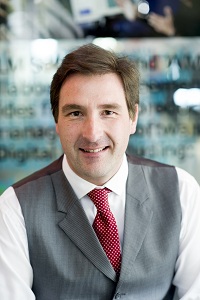 David Greenwood, Professor of Advanced Propulsion Systems at WMG explained: “Automotive batteries will halve in cost, double in energy density and see tenfold increases in manufacturing volumes before the end of the next decade. To do this we need advanced materials supplied in bulk and at very high quality. High value opportunities exist in cathode powders, anode powders, electrolytes, collector foils and separators, and the supply chain to provide them is in its infancy.”
David Greenwood, Professor of Advanced Propulsion Systems at WMG explained: “Automotive batteries will halve in cost, double in energy density and see tenfold increases in manufacturing volumes before the end of the next decade. To do this we need advanced materials supplied in bulk and at very high quality. High value opportunities exist in cathode powders, anode powders, electrolytes, collector foils and separators, and the supply chain to provide them is in its infancy.”
Key findings
It is no secret that the UK ambition of the UK Government is to stimulate the supply chain so that the UK can attract a ‘Giga-factory’. This report engaged with those members of the supply chain who would support new production capacity.
Currently three fifths of a vehicle battery pack’s value is chemicals and materials. The report has found that the UK could capture a £4.8bn/year share of this by 2030. This is down to the strong foundation of UK-based companies already embedded within many global battery supply chains.
Through strategic Government support and collaboration between our Automotive and Chemical sector there is a real opportunity to expand these existing capabilities growing capacity to serve UK-built batteries as well as significant growth in exports, especially as EU battery production grows.
For battery cell manufacturing to be economically viable there is a need for local suppliers of many materials. However, the expectation is that battery chemistry will evolve over the next decade, so it is fundamental that the companies involved within this supply chain are primed for innovation and manufacturing investment. An increase in capability and capacity offers further export potential.
The Government has already invested £246M through the Faraday Battery Challenge which has delivered valuable assets like there UKBIC and provided invaluable opportunities for the chemical, battery and automotive sector to work together and learn from one another. In order to realise this 4.8bn supply chain opportunity, the Government will continue to have a critical role to play in supporting the strategic investments in the UK battery and battery materials sectors, whilst also continuing to provide targeted funding for CR&D that allows the UK chemical sector to co-develop battery technologies with its customers.
The full report can be found here
Charging ahead at Battery School
PhD students, and future battery engineers, from leading universities across the UK joined us for a special week-long Battery School at our Energy Innovation Centre, for the Faraday Institution, recently.
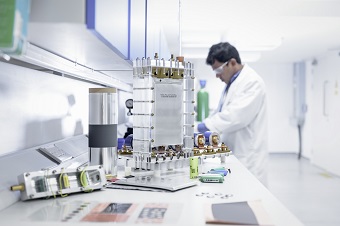 In our role as the Electrical Energy Storage APC Spoke, our battery experts facilitated a mix of lectures and practical sessions covering electrochemistry, applications, future technologies, manufacturing, safety, testing, forensics and battery end of life.
In our role as the Electrical Energy Storage APC Spoke, our battery experts facilitated a mix of lectures and practical sessions covering electrochemistry, applications, future technologies, manufacturing, safety, testing, forensics and battery end of life.
Fran Long, Education and Training Co-ordinator, at The Faraday Institution, said: “The WMG Battery School, at the University of Warwick, gave our PhD students a wonderful week of detailed theory and practice with an abundance of high quality lectures and ‘hands-on’ lab sessions.
“We would like to thank all of the WMG staff involved in making this such a valuable experience for the students. Encouraging the next generation of engineers into battery related careers, is extremely important for the UK’s electrification sector.”
The Faraday Institution is the UK’s independent institute for electrochemical energy storage science and technology, supporting research, training, and analysis. It brings together scientists and industry partners on research projects to reduce battery cost, weight, and volume; to improve performance and reliability; and to develop whole-life strategies from mining to recycling to second use.
The Battery School is part of the Faraday Battery Challenge, along with the UK Battery Industrialisation Centre (of which WMG was part of the winning consortium).
Find out more about our Energy Innovation Centre here.
First look at Coventry’s Innovative Light Rail Vehicle
Engineers and researchers at WMG, University of Warwick, are working alongside Transport Design International (TDI), based in Stratford, to develop a battery-powered, lightweight, rail-based vehicle to operate in Coventry.
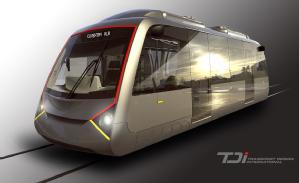 The WMG team, including engineers Darren Hughes and Andrew McGordon, are using their automotive engineering and battery expertise to assist TDI with the design of the vehicle for Coventry City Council, and now have a 3D simulation of the vehicle.
The WMG team, including engineers Darren Hughes and Andrew McGordon, are using their automotive engineering and battery expertise to assist TDI with the design of the vehicle for Coventry City Council, and now have a 3D simulation of the vehicle.
The vehicle will be battery-powered with the long term objective that it will become an autonomous vehicle, allowing more vehicles to operate intelligently and efficiently to meet passenger demand.
It will hold 50 passengers, and the longer term aim is that it will work like the London Underground system, where there is no timetable and people can hop on and off.
The vehicle will be a lightweight design using multiple materials including aluminium, steel and composites.
Due to being battery-powered there will be no overhead power supply which is both costly and has a negative impact to the city-scape. This feature provides future flexibility for operating on other non-electrified routes.
The first-of-a-kind design is available to view in 3D via WMG’s visualisation suite and the first test vehicle will be manufactured by mid-2020. TDI have partnered with Coventry-based Company RDM who will manufacture the vehicle once the design is complete.
A team of experts are also working to develop a new track system.
The Government’s Local Growth Fund through the Coventry and Warwickshire Local Enterprise Partnership (CWLEP) has contributed £2.46 million towards phase one of the research and design of the prototype and £12.2 million has been secured from the West Midlands Combined Authority (WMCA) Devolution Deal to undertake the research and development required to prove the VLR concept.
The WMCA has also allocated specialist resource from Transport for West Midlands to provide technical support, advice and guidance to the project team as the scheme develops.
Dr Darren Hughes, WMG, University of Warwick comments:
“The Coventry light-rail system will be innovative in bringing together technologies from a number of sectors to deliver a low-cost environmentally-sustainable public transport solution for the City of Coventry. Seeing the 3D simulation and envisaging how it will look within Coventry makes us look forward to building the first vehicle that will be ready for testing at a test track facility during 2020.”
 Councillor Jim O’Boyle, cabinet member for jobs and regeneration, comments:
Councillor Jim O’Boyle, cabinet member for jobs and regeneration, comments:
“Very Light rail is a fantastic innovation and it has the potential to transform the way people travel. It will be much more affordable to install than traditional trams, take up far less road space, be able to run alongside traffic and our ultimate aim is that it doesn’t require a driver so it can be a frequent service.
“Coventry has a rich traditional of vehicle manufacturing and now we are leading the way in future transport too. This Very Light Rail work, combined with our work on driverless and connected cars puts us right at the forefront of creating new, ground breaking solutions for future transport needs. They will be safer and more environmentally friendly and I hope go on to provide good job opportunities for local people too.”
Jonathan Browning, chair of the CWLEP, comments:
“Coventry and Warwickshire is at the forefront of battery technology and this exciting scheme emphasises our skills at leading the way in innovation.
“This new technology will bring more jobs and investment to Coventry and Warwickshire and it underlines the value of partnership working to boost the area’s economy.
“It is great news that the prototype of the Very Light Rail vehicle will be built ahead of Coventry being UK City of Culture in 2021 when the area’s profile will be boosted on a global stage.”
MIA Motorsport Conference and Business Excellence Awards 2019
The WMG centre HVM Catapult team attended the esteemed MIA Energy Efficient Motorsport Conference, earlier this month.
The event showcases leading figures from motorsport, automotive and beyond to discuss current and future technology development, and explores the many opportunities for business growth and success.
A t the conference, our Professor Dave Greenwood joined other experts for a lively panel discussion entitled 'What's in it for me? Electric Power in Motorsport and Automotive'.
t the conference, our Professor Dave Greenwood joined other experts for a lively panel discussion entitled 'What's in it for me? Electric Power in Motorsport and Automotive'.
In the evening, the MIA held its prestigious Business Excellence Awards. WMG sponsored the ‘Export Achievement Award,’ with AP Racing crowned much-deserved winners. The AP Racing team were presented with their award by the CEO of our WMG centre HVM Catapult, Archie MacPherson.
You can read more about MIA events here.
New report says UK electric vehicle battery industry could be worth £2.7 billion per year for UK chemical companies
 A new report published today Monday 25th June 2018 shows that UK companies are well-placed to supply valuable materials needed for batteries to be built in UK – a potential £2.7 billion per year business opportunity. The report commissioned by WMG at the University of Warwick, was launched to the Chemical Industry Association at the Chemistry Growth Partnership meeting in London, chaired by Steve Foots, Chief Executive of Croda, and attended by Richard Harrington MP.
A new report published today Monday 25th June 2018 shows that UK companies are well-placed to supply valuable materials needed for batteries to be built in UK – a potential £2.7 billion per year business opportunity. The report commissioned by WMG at the University of Warwick, was launched to the Chemical Industry Association at the Chemistry Growth Partnership meeting in London, chaired by Steve Foots, Chief Executive of Croda, and attended by Richard Harrington MP.
The research underpinning the report brought together experts and data from the automotive battery industry and chemicals industry, working in the context of the UK’s Industrial Strategy, points to a large UK battery manufacturing industry opportunity. The report was funded by EPSRC, commissioned and managed by WMG at the University of Warwick acting in their role as the Advanced Propulsion Centre Electrical Energy Storage Spoke, and delivered in partnership with E4tech. WMG’s Professor David Greenwood, one of the report’s authors said:
“This report details a massive opportunity to grow a UK battery chemicals industry and related supply chain. The UK’s Industrial Strategy identified battery development and manufacture as one of the four initial Grand Challenges to coalesce industrial activity upon high growth opportunities. Battery pack manufacturing for electric vehicles (EVs) will logically take place close to the point of vehicle assembly since packs are hard to transport. This in turn implies that the battery cells which make up the packs will best be manufactured in (or close to) the UK. This could also mitigate the loss of vehicle engine production.”
“However for cell production to occur in the UK, the supply chains of chemicals would need to be reconfigured, since most cell production and chemicals supply is currently in Asia. Whilst such components could be imported, to capture the most value cell production and the related chemical and process equipment supply would need to come from UK suppliers.”
RESOLVE prototypes shape future of electric urban commuting
 The future of daily urban commuting could be small, lightweight Electric L-category Vehicles (ELVs). A cost effective, energy efficient and comfortable alternative to traditional cars in cities, is at the heart of the €6.92m RESOLVE project, which included WMG at the University of Warwick.
The future of daily urban commuting could be small, lightweight Electric L-category Vehicles (ELVs). A cost effective, energy efficient and comfortable alternative to traditional cars in cities, is at the heart of the €6.92m RESOLVE project, which included WMG at the University of Warwick.
The European project – named ‘Range of Electric Solutions for L-category Vehicles’ – designed and developed two stylish tilting four-wheeler prototype ELVs with leading European manufacturers Piaggio and KTM. These demonstrators were unveiled, and presented to representatives from the European Commission, at an event in Brussels in April 2018.
WMG was one of fourteen partners in the project, which included leading names from industry and research such as Piaggio, KTM, Bosch, Ricardo, the Austrian Institute of Technology, and the University of Florence.

